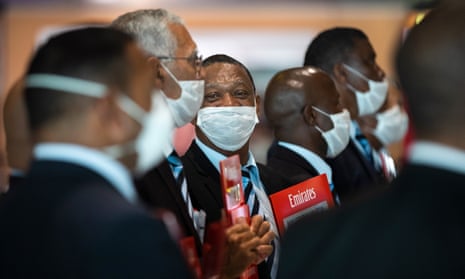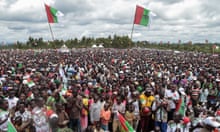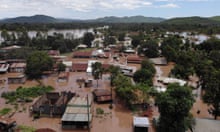Countries across Africa have imposed wide-ranging and stringent new measures as the coronavirus begins to spread more rapidly across the continent.
Though the continent is still far behind Europe and Asia in the total numbers of Covid-19 cases, the disease has now reached about half of its countries. Algeria has 48 confirmed cases, Egypt 110, while South Africa has 62, according to the World Health Organization and national governments on Monday. Other countries have fewer cases, mostly in single figures.
Somalia, Liberia and Tanzania registered their first cases on Monday. Most were brought to the continent by travellers from overseas but increasing numbers of internal transmissions are being recorded.
African governments and health officials have warned that the disease will cause massive challenges for underresourced health services across the continent. Several countries have introduced restrictions on air travel from regions in Europe or Asia that have been badly hit.
South Africa, which declared a national disaster on Sunday, has said travellers coming from South Korea, many European countries, the US, and the UK will now have to apply for visas to visit, which appear unlikely to be granted. It also cancelled more than 8,000 visas granted earlier this year to travellers from China and Iran.
Algeria has suspended air and maritime links with Europe; Morocco has suspended all international flights; and Liberia has imposed a ban on all travel from countries with more than 200 coronavirus cases.
The Kenyan president, Uhuru Kenyatta, said his government was suspending travel from any country with reported Covid-19 cases. “Only Kenyan citizens, and any foreigners with valid residence permits will be allowed to come in, provided they proceed on self-quarantine,” he told the nation in a televised address.
The ban would take effect within 48 hours and remain in place for at least 30 days, he said.
Governments are also moving to prepare populations for significant sacrifices as the disease spreads further. In a press conference on Monday, the South African health minister, Zweli Mkhize, told compatriots they should be ready for “hard combat”.
“We need to move fast to reduce the speed [of the spread of the coronavirus]. We have to turn ourselves into soldiers, ready to fight. Every South African [must] be a soldier,” he said. “We are determined to suffer as few casualties as possible. We are determined to take hard decisions if need be.”
There was a possibility that South Africa would need to declare a state of emergency, Mkhize said.
Q&AHow can I protect myself and others from the coronavirus outbreak?
Show
The World Health Organization is recommending that people take simple precautions to reduce exposure to and transmission of the coronavirus, for which there is no specific cure or vaccine.
The UN agency advises people to:
- Frequently wash their hands with an alcohol-based hand rub or warm water and soap
- Cover their mouth and nose with a flexed elbow or tissue when sneezing or coughing
- Avoid close contact with anyone who has a fever or cough
- Seek early medical help if they have a fever, cough and difficulty breathing, and share their travel history with healthcare providers
- Advice about face masks varies. Wearing them while out and about may offer some protection against both spreading and catching the virus via coughs and sneezes, but it is not a cast-iron guarantee of protection
Many countries are now enforcing or recommending curfews or lockdowns. Check with your local authorities for up-to-date information about the situation in your area.
In the UK, NHS advice is that anyone with symptoms should stay at home for at least 7 days.
If you live with other people, they should stay at home for at least 14 days, to avoid spreading the infection outside the home.
In many African countries, schools and universities have closed for extended Easter holidays, sporting events cancelled and assemblies of more than 100 people banned. South Africa has also forbidden prison visits, and conferences in the country are also being cancelled.
Morocco has shut cinemas, theatres and cafes. Ghana, which has six confirmed coronavirus cases, has banned most public gatherings for a month.
Many sporting events have been halted – with at least eight countries suspending their football leagues. Others are expected to follow. Football’s world governing body, Fifa, has postponed its annual meeting, to be held this year in the Ethiopian capital of Addis Ababa, until the autumn.
In South Africa, sporting events such as the Two Oceans ultra marathon have been postponed until the autumn or cancelled. South Africa’s rugby authorities suspended on Monday all national team training camps and business travel.
Officials across the continent are also consulting with religious leaders. Mosques in Morocco and Tunisia have been shut amid fears that mass gatherings planned by churches for Easter could accelerate the spread of the virus.
Most people recover from the virus without significant problems. According to the World Health Organization, people with mild illness recover in about two weeks, while those with more severe illness may take three to six weeks.
However, a minority develop more serious conditions, such as pneumonia, and many experts say that though a youthful population will be more resilient, Africa’s health systems may not be adequately prepared to care for large numbers of people who may need intensive care and ventilators.
There are growing concerns for vulnerable refugee populations on the continent, both those who live in camps or amid host populations, and other marginalised communities that will not be able to access help.
South Africa, probably the best prepared in sub-Saharan Africa, has only 89,000 hospital beds for a population of 56 million people. Fewer than 1,000 of these beds can provide intensive care to the most serious cases.
The country’s flagging economy is poorly placed to withstand further strain, with soaring unemployment, a weakening currency and key utilities crippled by debt.
The South African finance minister, Tito Mboweni, said despite having money available through the National Disaster fund it may need to set aside further funding to deal with the coronavirus outbreak.
“As the situation develops we will need to set aside further funding, that means we will have to reduce programmes throughout the government system by reducing the allocated amounts,” said Mboweni during a conference outlining new measures to contain the outbreak in South Africa.
Some countries may be underestimating the presence of the disease, experts believe. Egypt is likely to be grappling with a higher rate of coronavirus infections than official figures suggest, according to research by Canadian disease specialists and increasing infection among tourists who departed in recent weeks.
Africa’s relative lack of global connectivity has given some weeks in which to prepare. In January only South Africa and Senegal had laboratories capable of testing for coronavirus. Now more than 40 countries have such facilities.
Experts also say that experience of dealing with epidemics such as Ebola in many African countries will be critical in tracing and isolating cases as authorities work to slow the spread of the disease.









